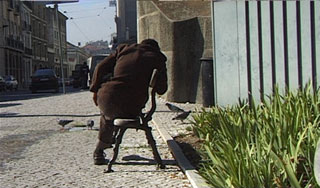Images of a Lost City
Imagens de uma cidade perdida USA, PORTUGAL / 2011 / Portuguese / Color / Blu-ray (SD) / 92 min
USA, PORTUGAL / 2011 / Portuguese / Color / Blu-ray (SD) / 92 min
Director, Photography, Editing, Sound: Jon Jost
Music: Amalia, Alfonso Seco
Producer, Source: Jon Jost
www.jon-jost.com
A street corner in Lisbon. Women sit on a bench in a stone-paved square at the top of a hill. Youths mess around with motorbikes. People walk up and down the hill. Languid, listless light and wind. A tram. Children having fun playing soccer. The sound of a guitar, overlapping with the long shadows of trees. These may be ordinary everyday scenes, but they are also beautiful and somehow melancholy. This is a visual poem dedicated to a “lost city,” made over a period of 15 years by Jon Jost.
[Director’s Statement] Images of a Lost City was shot in 1996–1997, right after the DV (digital video) format was first marketed for consumers. On its arrival I quickly realized its large potential, dropped all thought of working further in film, and began to shoot solely in DV. Courtesy of its very low cost it was possible to shoot large amounts of material, as well as to do very long shots. This in turn, along with other aspects of DV, pointed to another aesthetic than that which dictated celluloid filmmaking, and I promptly went into exploring this in many ways, as the diverse qualities of London Brief (1997), Nas correntes de luz da ria formosa (1999), 6 Easy Pieces (2000), and OUI NON (2002) all demonstrate.
Images of a Lost City was culled from some 11 hours of material that I shot in that period and saved (I shot much more but junked the uninteresting material the same day as shooting it). Having no narrative, it was very difficult to edit—hence the long period between the shooting and the completion of it. Such work requires a completely different sense of rhythm, time, attentiveness to ambient sound, and figuring out how to orchestrate it through time without the easy hooks of “a story” or some “topic.”
Images of a Lost City is about a place and its spirits and ghosts. I hope it has properly caught some of the particular and specific qualities which are Lisbon.
 Jon Jost
Jon Jost
Born in Chicago in 1943 of a military family, Jon Jost grew up in Georgia, Kansas, Japan, Italy, Germany, and Virginia. Expelled from college in 1962, he began making 16mm films in January 1963. He is self-taught. He has made some 20 shorts and 14 feature-length films (celluloid, 16 and 35mm), all of which he has conceived, written, photographed, directed, and edited; most of these he also produced. After ten years of making short works, Jost made his first feature-length film in 1974. He has since devoted himself to making a wide-ranging series of films. Jost presently lives in Seoul, teaching as full professor at Yonsei University and working on numerous projects with his wife, Marcella. Plain Talk and Common Sense (Uncommon Senses) (1987), London Brief (1997), 6 Easy Pieces (2000, YIDFF 2001 Runner-up Prize) and OUI NON (2002) were screened at YIDFF 1989, 1997, 2001, and 2003, respectively. |
